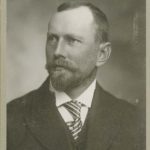 About the author: Dean Conant Worcester (October 1, 1866 – May 2, 1924). Professor of Zoology of University of Michigan, member of the Philippine Commission, 1899-1913. The guide to the Dean C. Worcester papers, 1887-1925, (Bentley Historical Library University of Michigan) provides this biography:
About the author: Dean Conant Worcester (October 1, 1866 – May 2, 1924). Professor of Zoology of University of Michigan, member of the Philippine Commission, 1899-1913. The guide to the Dean C. Worcester papers, 1887-1925, (Bentley Historical Library University of Michigan) provides this biography:
Dean Conant Worcester was born in Thetford, Vermont, the youngest son of an impoverished family of nine children. In 1884, his older brother and sister paid his expenses to the University of Michigan where he majored in zoology and came under the influence of Joseph B. Steere, chair of the Department of Zoology. In 1887, still an undergraduate, Worcester joined Steer’s expedition to the Philippines, financing the costs by insuring his life and borrowing on the policy.
The Steere expedition was recognized as a scientific success. With academic credit for his participation in the expedition and a semester’s work in zoology, Worcester obtained his A.B. degree in 1889. He and Frank Bourns, also of the Steere expedition, planned a longer sojourn in the Philippines and found financing through the University of Minnesota and a wealthy Minneapolis businessman Louis F. Menage. The Menage Expedition, 1990-1993, resulted in the collection of over three thousand specimens of birds, bats, butterflies, reptiles, mammals, corals, shells and in ethnological material. Upon his return, Worcester married Nanon Fay Leas and in the autumn of 1893 became an instructor in animal morphology at the University of Michigan. He began publishing monographs on Philippine birds, with Bourns and alone, and in 1895 he was promoted to assistant professor of zoology and appointed curator of the Zoological Museum.
In 1897 Worcester delivered his first general public lecture on the Philippines to the Unity Club of Ann Arbor and in that same year published his first general article on the Philippines, “Spanish Rule in the Philippines, co-authored with Bourns. With Dewey’s victory over the Spanish in Manila Bay (May 1, 1898), Worcester began to think of the exciting prospect of the Philippines as an American colony. During a six week period, July 10 to September 1, 1898, Worcester wrote a very successful book, The Philippine Islands and Their People, based on the letters he had written home during his scientific expeditions. A few months later, and as the McKinley government moved to extend American military control over the Philippine archipelago, a letter from his expedition colleague Frank Bourns warning of the danger of a Philippine insurgency led him to seek a meeting with President McKinley at which time he presented Bourns’ views and augmented them with his own. McKinley asked Worcester to join a “civilian commission composed of men skilled in diplomacy and statesmanship” as requested by Admiral Dewey who was alarmed at the rejection by the newly declared Filipino government of the U.S. program of benevolent assimilation.
Through his participation in both the First and Second Philippine Commissions and in his position of Secretary of the Interior in the Commission government from 1901 to 1913, Worcester continued to have great influence on the formulation and implementation of American policy in the Philippines. His tenure on the First and Second Philippine Commissions would be the longest of all the commissioners. Worcester’s rejection of independence for the Philippines, first voiced in an 1899 interview with Dr. Apacible, a Philippine insurgent with whom Worcester met in Hong Kong on his voyage to the Philippines, would never waver.
In 1913 Worcester resigned his position with the Philippine Commission to become vice-president of the Philippine-American Company. The following year he published The Philippines Past and Present and continued to direct various business enterprises until his death. Worcester’s influence on American colonial policy and the various and controversial roles he played in the Philippines from his first visit in 1887 to his death in Manila in 1924: scientist, government official, propagandist and entrepreneur, earned him both accolades and deep resentment.
About the diary: Typescript in the National Library of the Philippines, NLP Digital Collections, H. Otley Beyer Ethnographic Collection, as The Diary of Dean C. Worcester. The Typescript is identified as Sinag-Kalinga Paper No. 80: (Extracts from) The Diary of Dean C. Worcester recorded on a trip through the Mountain Province region in 1904-1905.